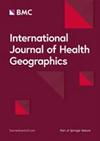建筑环境、特定目的步行行为与超重:来自中国中部武汉市的证据
IF 3
2区 医学
Q2 PUBLIC, ENVIRONMENTAL & OCCUPATIONAL HEALTH
引用次数: 0
摘要
客观和主观环境因素对健康结果的影响一直是人们热议的话题,越来越多的研究承认,积极锻炼的生活方式在促进健康方面发挥着重要作用。然而,人们对环境因素的确切影响仍未达成共识。本研究以中国内陆特大城市武汉为背景,结合环境影响的客观和主观方面,探讨了个人健康结果与交通和休闲步行行为之间的相关性,为上述讨论做出了贡献。我们采用街景图像、多源地理空间数据和问卷调查来描述 "5D+绿化 "街区环境的客观和感知特征。利用多组结构方程模型来揭示环境因素、特定目的步行和超重之间的复杂关系和性别异质性。我们的研究结果表明,客观的土地使用多样性和感知到的便利性都与超重有显著关联。当地服务设施的便利性和可见绿化都会促进交通和休闲步行。感知到的社区安全性会促进交通步行,而感知到的步行便利性则与休闲步行呈正相关。值得注意的是,休闲步行通常被认为是有益的,但却与超重情况呈正相关,起到了调节作用。在环境与特定目的步行以及体重之间存在性别差异。研究结果支持将支持活动的建筑环境规划为预防肥胖的重要策略。本文章由计算机程序翻译,如有差异,请以英文原文为准。
The built environment, purpose-specific walking behaviour and overweight: evidence from Wuhan metropolis in central China
The impact of objective and subjective environmental factors on health outcomes has been a topic of significant debate, with a growing body of research acknowledging the role of a physically active lifestyle in promoting health. However, consensus regarding their precise influence remains elusive. This study contributes to these discussions by exploring how individual health outcomes correlate with transport and leisure walking behaviours, set against both the objective and subjective aspects of environmental influences in the context of Wuhan, an inland Chinese megacity. Street view images, multi-source geospatial data and a questionnaire survey were employed to characterise the “5D + Greenery” objective and perceived characteristics of the neighbourhood environment. Multi-group structural equation modelling was utilised to unravel the complex relationship and gender heterogeneity among environmental factors, purpose-specific walking, and overweight. Our results suggest that both objective land use diversity and perceived convenience are significantly associated with overweight. The accessibility of local service facilities and visible greenery promote both transport and leisure walking. While perceived neighbourhood safety encourages transport walking, perceived walkability is positively correlated with leisure walking. Notably, leisure walking, usually considered beneficial, presents a positive association with overweight conditions, acting as a mediation. Gender disparities exist in pathways between the environment and purpose-specific walking, as well as weight. The findings lend support to the planning of an activity-supporting built environment as a crucial strategy for obesity prevention.
求助全文
通过发布文献求助,成功后即可免费获取论文全文。
去求助
来源期刊

International Journal of Health Geographics
PUBLIC, ENVIRONMENTAL & OCCUPATIONAL HEALTH -
CiteScore
10.20
自引率
2.00%
发文量
17
审稿时长
12 weeks
期刊介绍:
A leader among the field, International Journal of Health Geographics is an interdisciplinary, open access journal publishing internationally significant studies of geospatial information systems and science applications in health and healthcare. With an exceptional author satisfaction rate and a quick time to first decision, the journal caters to readers across an array of healthcare disciplines globally.
International Journal of Health Geographics welcomes novel studies in the health and healthcare context spanning from spatial data infrastructure and Web geospatial interoperability research, to research into real-time Geographic Information Systems (GIS)-enabled surveillance services, remote sensing applications, spatial epidemiology, spatio-temporal statistics, internet GIS and cyberspace mapping, participatory GIS and citizen sensing, geospatial big data, healthy smart cities and regions, and geospatial Internet of Things and blockchain.
 求助内容:
求助内容: 应助结果提醒方式:
应助结果提醒方式:


